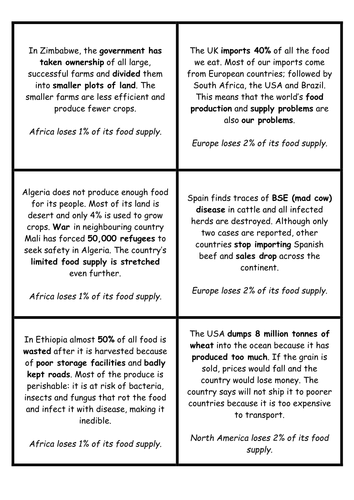








This is a one-off lesson based on a game. ‘The Hunger Game’ explores the issues of food insecurity and reasons why the world’s food supply is distributed unevenly.
The game uses Skittles and requires teams of six students. Each player represents a continent and Skittles are distributed according to what percentage of the world’s food supply that continent receives. Real life events are played out and players lose or gain food supplies. Players can intervene and provide food aid to other continents. At the beginning and end of the game students each complete a worksheet which encourages reflection of the events that affected them and others, and how they felt about it.
I designed this game for an observation lesson and received an ‘outstanding’. It is an original resource which was inspired by the popular Jelly Babies Population Game.
I have used the game with both a low and high ability Year 8 class and also a Year 12 class. The KS3 and A-Level groups were highly engaged with the lesson and played the game independently. Differentiation was very much through team discussion, reflection outcomes and teacher questioning. I was amazed by the implications discussed by the higher ability Year 8 class – issues we hadn’t yet covered in lessons.
The game requires 100 Skittles per team and plastic cups or bowls for players to keep them in. The resources provided include:
Lesson plan
PowerPoint
Starter and plenary activity
Player instructions
Continent profiles
Student worksheet
Positive and negative chance cards
It is ideal for a 60 minute lesson but could easily be extended through follow-up discussion. I managed to squeeze it into a 50 minute lesson, but revisited the worksheet the following lesson to reflect on the outcomes and key learning points.
Please leave feedback and/or rate if you do purchase this lesson! Thank you!
The game uses Skittles and requires teams of six students. Each player represents a continent and Skittles are distributed according to what percentage of the world’s food supply that continent receives. Real life events are played out and players lose or gain food supplies. Players can intervene and provide food aid to other continents. At the beginning and end of the game students each complete a worksheet which encourages reflection of the events that affected them and others, and how they felt about it.
I designed this game for an observation lesson and received an ‘outstanding’. It is an original resource which was inspired by the popular Jelly Babies Population Game.
I have used the game with both a low and high ability Year 8 class and also a Year 12 class. The KS3 and A-Level groups were highly engaged with the lesson and played the game independently. Differentiation was very much through team discussion, reflection outcomes and teacher questioning. I was amazed by the implications discussed by the higher ability Year 8 class – issues we hadn’t yet covered in lessons.
The game requires 100 Skittles per team and plastic cups or bowls for players to keep them in. The resources provided include:
Lesson plan
PowerPoint
Starter and plenary activity
Player instructions
Continent profiles
Student worksheet
Positive and negative chance cards
It is ideal for a 60 minute lesson but could easily be extended through follow-up discussion. I managed to squeeze it into a 50 minute lesson, but revisited the worksheet the following lesson to reflect on the outcomes and key learning points.
Please leave feedback and/or rate if you do purchase this lesson! Thank you!
Something went wrong, please try again later.
Pupils really enjoyed this game. Some of the cards can be challenging for pupils with lower literacy levels, but teams tended to pull together to help each other out on this front. Great way to think about how global events effect our food security.
Pupils loved this and it was a good way to get them thinking of the different issues facing food supply globally and the inequalities that exist. I used it as the first lesson in the topic and it's set a good tone for the rest of the topic.
Report this resourceto let us know if it violates our terms and conditions.
Our customer service team will review your report and will be in touch.
£4.00